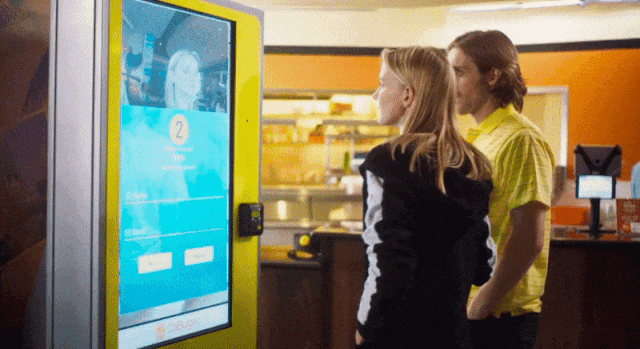Burger Chain in California teaming-up with surveillance company for face-scanning loyalty program. Dystopia Now, baby!
A local California burger chain is banking on its customers wanting fucking loyalty points more than they don’t want want their faces fucking scanned and logged in some database somewhere. I, the ever present cynic, am guessing they’re probably right. Who needs to fight against Dystopian futures when you can get free french fries or some shit. Who needs privacy when there are hamburgers at stake, bro!
Gizmodo:
A burger chain in California will scan your face to take your order, and they’ve tapped a global surveillance-technology firm to help them do it.
CaliBurger is currently testing out kiosks equipped with facial recognition at its Pasadena location, giving customers who sign up for their loyalty program the option to link their faces to their past preferred orders, which will pop up automatically on future visits. Starting next year, the company will even let customers pay with their faces, the company said. Not only do you get to place an order with your face, you can earn CaliCoin loyalty points while doing it!John Miller, CEO of Cali Group, a global conglomerate and CaliBurger’s parent company, said in a statement that the kiosks are a step in the company’s plan to “replace credit card swipes with face-based payments.” Adopting facial-recognition technology is, Miller explained, “part of our broader strategy to enable the restaurant and retail industries to provide the same kinds of benefits and conveniences in the built world that customers experience with retailers like Amazon in the digital world.”
To bring the brick-and-mortar world into the face-collecting digital future, Cali Group is working with NEC Corporation of America, which created the NeoFace facial-recognition tech used in CaliBuger’s kiosks. NEC’s technology powers facial recognition systems around the world—including, notably, those used for population surveillance.
NEC Europe equipped South Wales Police with its flagship facial recognition software, allowing the police force to locate individuals on watchlists using real-time surveillance on its CCTV cameras. NEC rolled out a similar surveillance system throughout major cities in Georgia, using the company’s NeoFace Watch video facial-recognition software to check for “suspicious individuals” in real-time via CCTV footage. And NEC Australia recently teamed up with a vision analytics firm to enable real-time facial recognition from both fixed and mobile cameras, including body cams and drones.
If it’s any comfort, an NEC spokesperson told Gizmodo that “Cali Group owns the data for its kiosks,” and NEC “does not handle the data.”
“We provide a tool for matching live faces to the face on file,” NEC’s John Wise said.
Cali Group’s Miller, meanwhile, assured us in an email that the company is not creating a database of customer photos nor videos—while reminding us that we’re all being constantly spied on by CCTV cameras.
“We do not generate any new visual data that is not already being captured by CCTV’s in retail locations around the world,” Miller said. “Unlike CCTV, Cali Group does not store images of people. What is stored is a unique ‘digital fingerprint’ of the face itself and not any image or other identifiable information.”
Miller added that the CaliBurger kiosks “are available on an opt-in basis and customers have noted an overwhelmingly positive experience with the kiosks thus far.”
“Privacy is our top concern and Cali Group does not sell or lease data to third parties,” Miller concluded.
Facial recognition isn’t new, but it’s becoming increasingly common as tech companies and governments turn to this type of biometric data to track and identify individuals. And while not all use cases are outwardly insidious—like ordering a cheeseburger and fries—it’s important to consider the consequences of a database of sensitive facial biometric data.
“In short, facial biometrics are dangerous because there are few rules regulating their collection, use, and dissemination even though they are capable of causing real harm,” Woodrow Hartzog, professor of law and computer science at Northeastern University, told Gizmodo in September. He added, “If a database of faceprints were compromised, it would have a ripple effect on authentication systems that used the faceprint, as well as possibly allow unauthorized parties to make use of the faceprint for surveillance.”
Now, that’s something to chew on.




